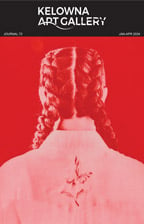
June 23 to September 16, 2007
Twenty years ago as a young art student Renay Egami visited Hiroshima, Japan. Recalling her visit to the Peace Memorial Museum located there, Egami observed the unthinkable destruction caused by the first atomic bomb, dropped in 1945: burned clothing, melted bottles, human shadows emblazoned on architectural surfaces. Yet the presence of life beyond the museum walls had become transformed into a beautiful park space where families picnicked amongst the backdrop of the cherry blossom festival. Egami’s reactions to this and other dualities are the bases of Picnic, a new site-specific installation for the Kelowna Art Gallery.
The subject of Egami’s new body of work surfaces as the prospect of global nuclear warfare is still a possibility, despite the lasting images and testimonies of A-bomb survivors. The horrors of the unthinkable metamorphose into memories, and by nature, become less specific and more emotionally driven. A sense of erasure seems to occur and the emphasis on terror transforms into beauty.
By employing black metal chain this duality also exists. At once it symbolizes the radio-active rain that fell shortly after the bomb and coalesces into a 3-dimentionalshape echoing the symbolic mushroom cloud commonly associated with nuclear explosions. The exhibition continues in the Courtyard where Egami focuses on the effect of the bomb on material objects. The distortion of the melted glass receptacles reminds us of the destructive nature of the heated blast, yet the arrangement is provocative and beautiful.
This is just one interpretation of an experience; however the philosophy of memory and its encompassing dualities are universal. The artist even goes further to question; does erasure itself cause memory? This provoking query underlines the fluid state of our consciousness. New memories are constantly evolving and with them come new sets of realities, experiences and explanations.
Renay Egami is an Assistant Professor in the Faculty of Creative and Critical Studies, University of British Columbia Okanagan. She has exhibited her sculpture and installation-based work in group and solo exhibitions in Canada and internationally, in Japan, the United States and Australia.
Sarah Campbell
Curatorial Assistant and Registrar
Renay would like to thank Scott Crocker, Michelle Hall, Byron Johnston, Maureen Lisle and Anne Mihalcheon, for all their hard work, insight, and continued support in helping realize this installation.








